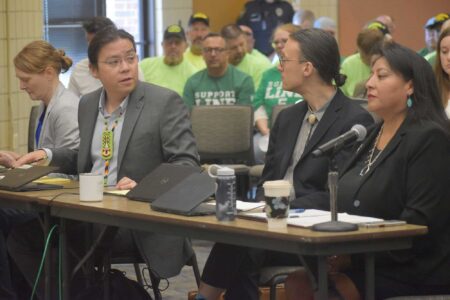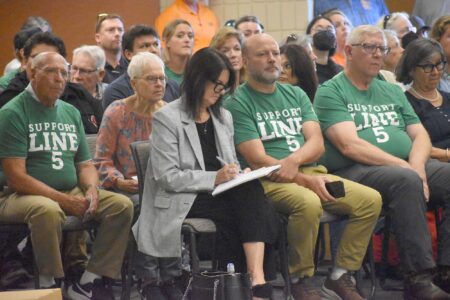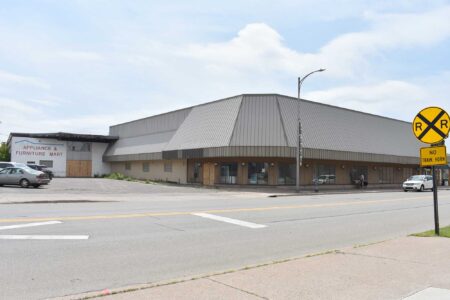Hearing process begins on challenge to Enbridge’s Line 5 reroute in Wisconsin
- Attorneys for the Bad River tribe present their case Tuesday as part of a challenge to key permits for Enbridge’s Line 5 relocation project in northern Wisconsin at a hearing in Ashland. (Danielle Kaeding/Wisconsin Public Radio)
- Supporters of the Line 5 relocation project in northern Wisconsin listen to opening statements Tuesday at a contested case hearing in Ashland, Wis. The Bad River tribe and environmental groups petitioned for the hearing as part of a challenge to key permits for the project. (Danielle Kaeding/Wisconsin Public Radio)
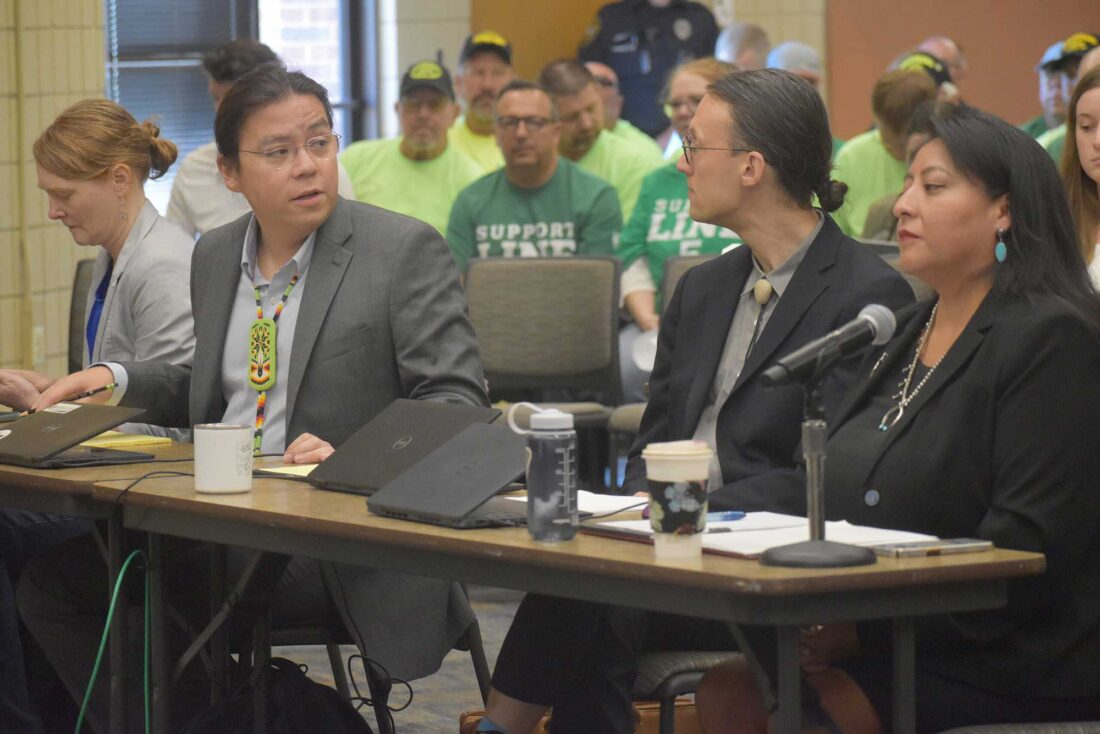
Attorneys for the Bad River tribe present their case Tuesday as part of a challenge to key permits for Enbridge’s Line 5 relocation project in northern Wisconsin at a hearing in Ashland. (Danielle Kaeding/Wisconsin Public Radio)
The Bad River tribe and environmental groups are making the case that the state should overturn key permits issued to Canadian energy firm Enbridge as it seeks to reroute an oil and gas pipeline around the tribe’s reservation in northern Wisconsin.
The state kicked off a contested case hearing in Ashland on Tuesday after the tribe, along with Midwest Environmental Advocates and Clean Wisconsin, challenged permits for the project in December. The proceedings will continue for weeks through Oct. 3.
In separate challenges, the tribe and environmental advocates argued the Wisconsin Department of Natural Resources failed to comply with state law when it granted a wetland and waterway permit along with a construction storm water permit for Enbridge’s Line 5 relocation project.
In 2020, Enbridge proposed building a 41-mile segment of the oil and gas pipeline around the Bad River tribe’s reservation after the tribe sued to shut down Line 5 on its lands in 2019. The project would cross close to 200 waterways and temporarily disturb around 101 acres of wetlands in Ashland and Iron counties.
Stefanie Tsosie, an Earthjustice attorney representing the tribe, argued the DNR lacks baseline information to determine the project’s impacts to the environment and wetlands.
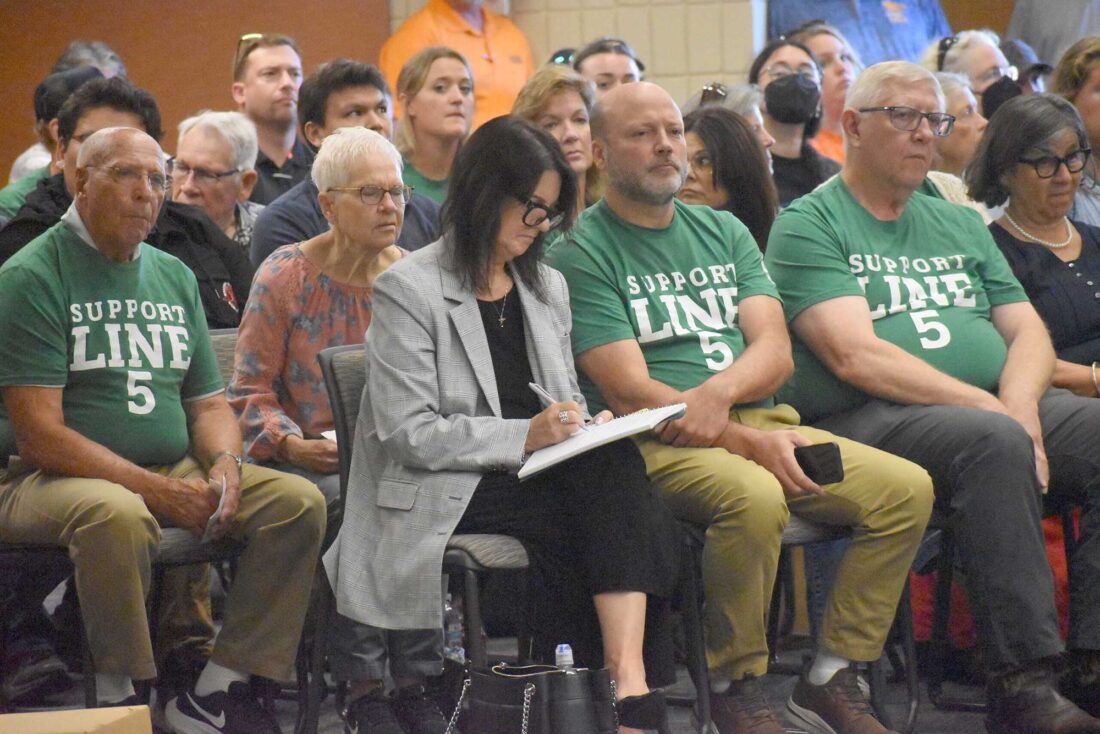
Supporters of the Line 5 relocation project in northern Wisconsin listen to opening statements Tuesday at a contested case hearing in Ashland, Wis. The Bad River tribe and environmental groups petitioned for the hearing as part of a challenge to key permits for the project. (Danielle Kaeding/Wisconsin Public Radio)
“If something happens to this region, the Band has nowhere else to go. It’s the Band’s homeland,” Tsosie said in the hearing. “These project impacts are not unavoidable and they are not acceptable under the state’s wetland and waterway laws.”
The project would involve blasting bedrock and drilling in waterways and wetlands upstream from the tribe’s reservation and internationally recognized wild rice beds. Bad River Tribal Chairman Robert Blanchard told WPR a potential oil spill would spell disaster for the tribe and its rights to hunt, fish and gather in the Bad River watershed.
“If something happens in that watershed, it’s going to affect what we can do as Native people,” Blanchard said. “It’s going to affect our way of life, and that’s why we are fighting this so hard.”
DNR Attorney Michael Kowalkowski said the record will show that the agency used the level of scrutiny and staff experience necessary to examine the known and potential impacts of the project.
“The combination of all these efforts is a fully informed and incredibly rigorous, yet rational, environmental review and permit process,” Kowalkowski said in the hearing.
State standards require applicants to avoid and minimize wetland impacts. Kowalkowski said the agency engaged external professionals and sought additional requirements from Enbridge on project plans over many months before issuing a wetlands permit, which included more than 200 conditions.
Evan Feinauer, attorney for Clean Wisconsin, argued the issue isn’t whether DNR earnestly reviewed the project.
“The question is whether they succeeded in adequately assessing the impacts and then comparing those impacts to what’s allowable under law. They just didn’t do that,” Feinauer said. “They didn’t do that in part because they’re relying on Enbridge to give them information.”
The hearing is the latest battle in a yearslong challenge to Enbridge’s Line 5 pipeline that carries up to 23 million gallons daily from Superior to Sarnia, Ontario. (Editor’s note: Line 5 crosses through Dickinson and Iron counties as it routes to the Straits of Mackinac and into lower Michigan.)
The tribe sued Enbridge to remove Line 5 from tribal lands after pipeline easements expired on roughly a dozen miles of pipe crossing the reservation.
Jennifer Smith, Enbridge’s tribal engagement director, said that its proposed reroute went through more than four years of extensive studies and review by state regulators.
“The route itself was built and changes (were) made so that we’re minimizing impacts,” Smith told WPR. “We believe that the Wisconsin DNR’s final environmental impact statement and final determination with issuance of the permits was correct.”
The company and its supporters argued the project will create 700 jobs and a roughly $135 million economic impact during construction. Adam Kaseno, a member of the International Union of Operating Engineers Local 139, said his family agreed to let Enbridge route Line 5 through their property near Marengo.
“It’s a good economic stimulation for the area to move forward with the project, but it’s also the safest way to transport the product,” Kaseno told WPR.
The Wisconsin Propane Association, American Petroleum Institute and Wisconsin Farm Bureau Federation also highlighted concerns over a potential propane shortage if Line 5 were shut down.
Opponents to the project, such as former Ashland public health nurse Susan Bietila, called fears of an energy shortage a distraction from the dangers posed by the project.
“We’re not talking about propane to heat our homes,” Bietila said. “We’re talking about a multinational corporation that has a history of spilling.”
Opponents have highlighted Line 5 has had around 30 releases on land, spilling about 1 million gallons of oil. Enbridge is also responsible for a 2010 spill that released more than 1.2 million gallons of oil into the Kalamazoo River in Michigan, as well as four aquifer breaches on the Line 3 replacement in Minnesota that released hundreds of millions of gallons of groundwater.
Smith said Enbridge can build the pipeline with “minimal environmental impact” that would be temporary during construction. She added that company officials are confident the state’s permits will be upheld.
The company has yet to secure federal approval from the U.S. Army Corps of Engineers, which has said it will issue a decision on the company’s permit by the end of this year. Enbridge said it’s ready to begin construction by the end of this year.
The company is also under a federal court order to pay the tribe $5.15 million for trespassing on tribal lands and reroute or shut down its Line 5 pipeline on the reservation by June of next year. Both the tribe and company are appealing that decision in the 7th U.S. Circuit Court of Appeals, and a ruling is still pending.

